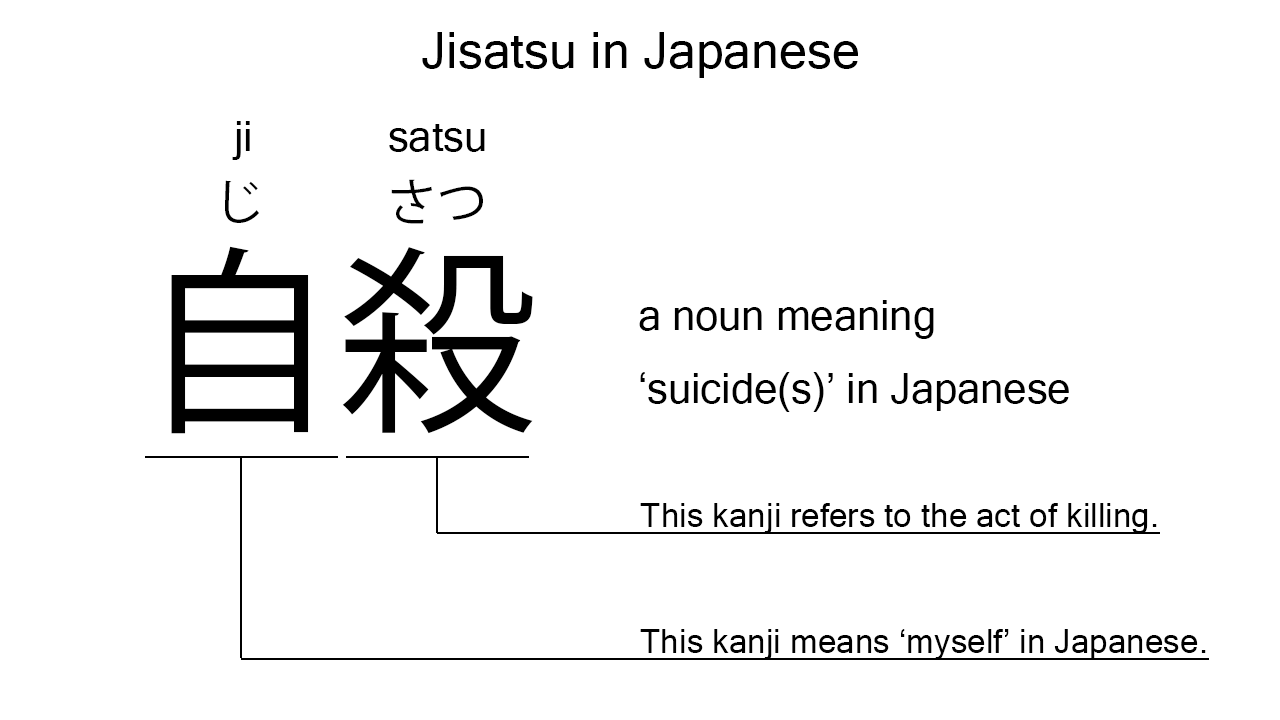What does “jisatsu” mean in Japanese?
Native speakers say “jisatsu” to mean ‘suicide’ in Japanese. Perhaps, some Japanese learners know this word as it is sometimes used in Japanese movies, novels, manga, anime, and the like. In this blog post, however, I will explain this word in detail based on its kanji expression. And also, I will explain how to use it through example sentences. My explanations would help Japanese learners understand “jisatsu” more clearly. Then, let’s get started!
Contents
Definition and meaning of “jisatsu”
Let me start with the definition and meaning of “jisatsu”.
- jisatsu – 自殺 (じさつ) : a noun meaning ‘suicide’ in Japanese. This can also work as plural. Learn more about Japanese plural.
The definition and meaning are simple and clear. To understand this noun more clearly, however, let me explain its kanji characters in detail, one by one.
What does “jisatsu” literally mean in Japanese?
The kanji expression of “jisatsu” consists of the following two kanji characters:
- 自 : a kanji character used to mean ‘myself’ in Japanese. This kanji can also be found in other words like “jibun“.
- 殺 : a kanji character used to refer to the act of killing. This kanji can also be found in other words like “korosu“.
These two kanji characters tell us that “jisatsu” literally means ‘killing myself’ in Japanese. This literal interpretation is very close to the actual meaning, I think. Suicides of people are often considered as the act of killing themselves.

When we meet new kanji expressions, we should check their kanji characters in detail to understand their meanings clearly and deeply. In many cases, kanji characters tell us a lot about the meanings of the expressions they form. Actually, here, we could get the better understanding of “jisatsu” through the detailed kanji check above.
So far, I’ve explained the definition and meaning of “jisatsu” together with its kanji characters. Then, let me explain how to use it through the example sentences below.
Example #1: how to say “suicide” in Japanese
jisatsu wa shakai mondai desu – 自殺は社会問題です (じさつはしゃかいもんだいです)
Suicide is a social problem.
Below are the new words used in the example sentence.
- wa – は : a binding particle working as a case marker or topic marker. In the example, this works after “jisatsu” to make the subject in the sentence.
- shakai – 社会 (しゃかい) : a noun meaning ‘society’ in Japanese. This can also work as plural. In the example, this works together with “mondai” to mean a ‘social problem’ in Japanese.
- mondai – 問題 (もんだい) : a noun meaning ‘problem’ in Japanese. This can also work as plural.
- desu – です : an auxiliary verb used after a noun or adjective to make it polite. Probably, this is well known as a part of the Japanese desu form. In the example, this is used after “shakai mondai” to make it sound polite.
This is a typical usage of “jisatsu”. When we want to mean ‘suicide’ in Japanese, this noun is a very good option.
Example #2: another usage of “jisatsu”
wakamono no jisatsu no kazu ga fue te iru – 若者の自殺の数が増えている (わかもののじさつのかずがふえている)
The number of suicides of young people is increasing.
Below are the new words used in the example sentence.
- wakamono – 若者 (わかもの) : a noun meaning ‘young people’ in Japanese.
- no – の : a case particle joining two nouns or noun equivalent words. Normally, the first one can work as a modifier to describe the second. In the example, the first “no” works to join “wakamono” and “jisatsu”. The formed phrase literally means ‘suicides of young people’ in Japanese. Word orders in Japanese and English are different, but the role of this case particle is similar to that of the English preposition, “of”.
- no – の : the same as above. The second “no” works to join “wakamono no jisatsu” and “kazu”. The formed phrase literally means ‘the number of suicides of young people’ in Japanese.
- kazu – 数 (かず) : a noun meaning ‘number’ in Japanese. This can also work as plural.
- ga – が : a case particle used to make the subject word or the object word in a sentence. In the example, this is used after “wakamono no jisatsu no kazu” to make the subject in the sentence.
- fue – 増え (ふえ) : one conjugation of the verb, “fueru”, which means ‘to increase’ in Japanese. In the example, it has been conjugated for the better connection with its following word.
- te – て : a conjunctive particle used after a verb, adjective, or auxiliary verb to make its te form. In the example, this is used after “fue” to make its te form, “fue te”. Verbs need to be changed to their te forms to be connected with “iru”.
- iru – いる : an auxiliary verb used to express the continuity of the action described by its preceding verb. In the example, this is used after “fue te” to express the continuity of its action.
This is another typical usage of “jisatsu”. In this example, it works as a part of the noun phrase, “wakamono no jisatsu no kazu”, which means ‘the number of suicides of young people’ in Japanese.
Summary
In this blog post, I’ve explained the definition and meaning of “jisatsu” in detail based on its kanji expression. And also, I’ve explained how to use it through the example sentences. Let me summarize them as follows.
- jisatsu – 自殺 (じさつ) : a noun meaning ‘suicide’ in Japanese. This can also work as plural. These two kanji characters literally mean ‘killing myself’ in Japanese. This literal interpretation is very close to the actual meaning, I think. Suicides of people are often considered as the act of killing themselves.
Hope my explanations are understandable and helpful for Japanese learners.